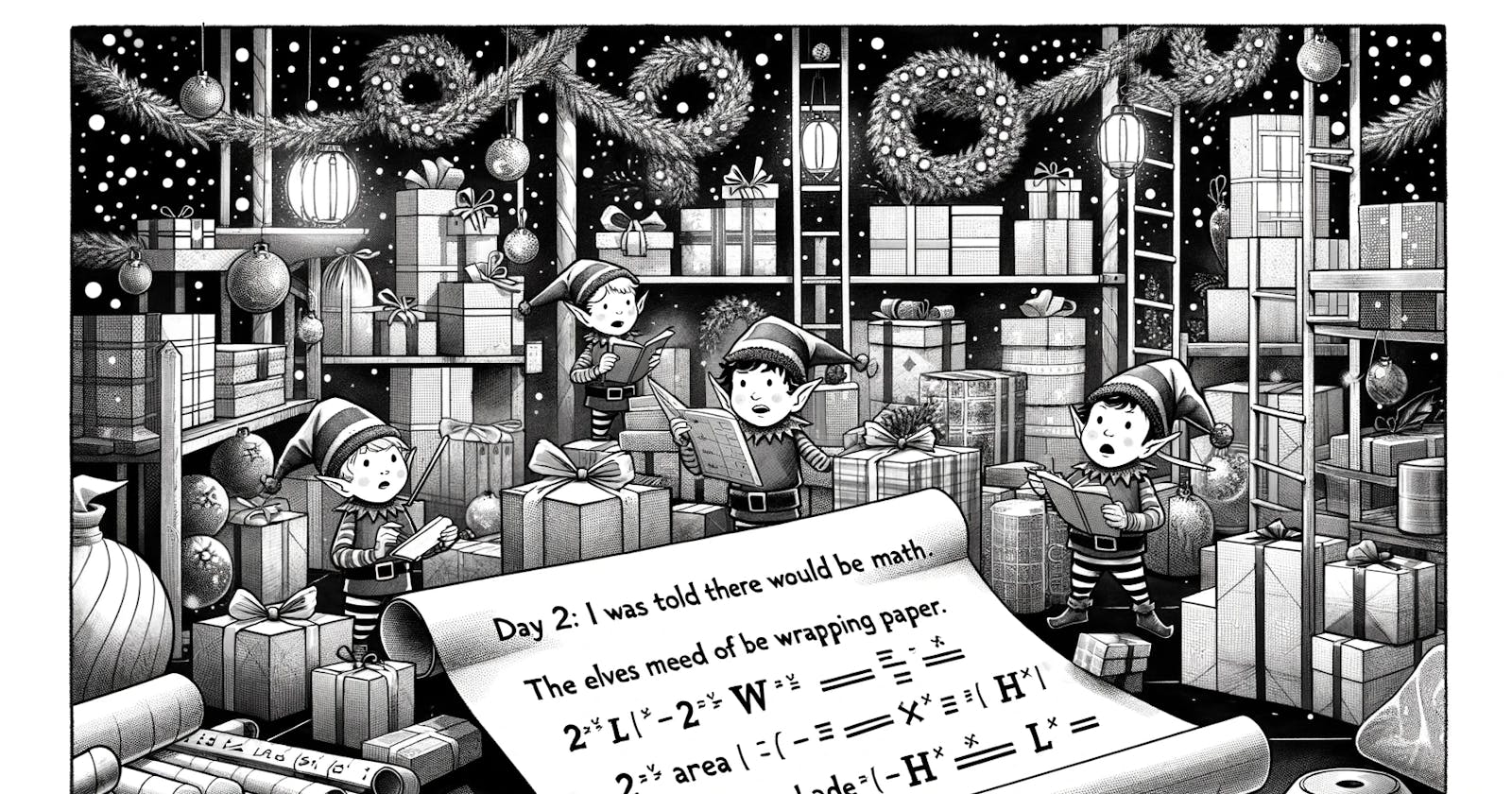The Puzzle Part One:
The elves are running low on wrapping paper, and so they need to submit an order for more. They have a list of the dimensions (length l, width w, and height h) of each present, and only want to order exactly as much as they need.
Fortunately, every present is a box (a perfect right rectangular prism), which makes calculating the required wrapping paper for each gift a little easier: find the surface area of the box, which is 2*l*w + 2*w*h + 2*h*l. The elves also need a little extra paper for each present: the area of the smallest side.
For example:
A present with dimensions
2x3x4requires2*6 + 2*12 + 2*8 = 52square feet of wrapping paper plus6square feet of slack, for a total of58square feet.A present with dimensions
1x1x10requires2*1 + 2*10 + 2*10 = 42square feet of wrapping paper plus1square foot of slack, for a total of43square feet.
All numbers in the elves' list are in feet. How many total square feet of wrapping paper should they order?
My Solution:
I create a file
Input.rsthe module for storing input of puzzles, and read this insizes_stringvariable.In
sizes_vecstored input separate by break lines ('\n') in a Vec of str.for each size in size_vec:
first trim the string
then convert the string "2x4x6" in a Vec of numbers [2, 4, 6].
create an area vector for storing the area of each group of size, multiply by two because those are rectangles.
finally, I obtained the smallest area, of the previous vec divide for two because is a rectangle and I need only one face.
and sum areas values and smallest_face in every iteration.
mod input;
fn main() {
let mut total_paper = 0;
let sizes_string = input::get_sizes();
let sizes_vec: Vec<&str> = sizes_string.split('\n').collect();
for sizes in sizes_vec {
let sizes_trimmed = sizes.trim();
let sizes_i32: Vec<i32> = sizes_trimmed
.split('x')
.map(|s| s.parse::<i32>().unwrap())
.collect();
let areas = vec![
2 * sizes_i32[0] * sizes_i32[1],
2 * sizes_i32[1] * sizes_i32[2],
2 * sizes_i32[2] * sizes_i32[0],
];
let smallest_face = areas.iter().min().unwrap() / 2;
total_paper += areas.iter().sum::<i32>() + smallest_face;
}
println!(
"They need to order {} square feet of wrapping paper 🎁.",
total_paper
);
}
Input.rs
pub fn get_sizes() -> &'static str {
"3x11x24
13x5x19
1x9x27
24x8x21
6x8x17
19x18x22"
}
Part Two:
The elves are also running low on the ribbon. Ribbon is all the same width, so they only have to worry about the length they need to order, which they would again like to be exact.
The ribbon required to wrap a present is the shortest distance around its sides, or the smallest perimeter of any one face. Each present also requires a bow made out of ribbon as well; the feet of ribbon required for the perfect bow is equal to the cubic feet of volume of the present. Don't ask how they tie the bow, though; they'll never tell.
For example:
A present with dimensions
2x3x4requires2+2+3+3 = 10feet of ribbon to wrap the present plus2*3*4 = 24feet of ribbon for the bow, for a total of34feet.A present with dimensions
1x1x10requires1+1+1+1 = 4feet of ribbon to wrap the present plus1*1*10 = 10feet of ribbon for the bow, for a total of14feet.
How many total feet of ribbon should they order?
My Solution:
The total ribbon needed is the sum of the perimeter plus the volume of sizes.
I create the perimeter from the sum of all sizes_i32 values minus the highest value in this vec, multiplied by two. For volume, multiply all sizes_i32 values. Then sum the perimeter and volume in every iteration for total_ribbon.
mod input;
fn main() {
let mut total_paper = 0;
let mut total_ribbon = 0;
let sizes_string = input::get_sizes();
let sizes_vec: Vec<&str> = sizes_string.split('\n').collect();
for sizes in sizes_vec {
let sizes_trimmed = sizes.trim();
let sizes_i32: Vec<i32> = sizes_trimmed
.split('x')
.map(|s| s.parse::<i32>().unwrap())
.collect();
let areas = vec![
2 * sizes_i32[0] * sizes_i32[1],
2 * sizes_i32[1] * sizes_i32[2],
2 * sizes_i32[2] * sizes_i32[0],
];
let smallest_face = areas.iter().min().unwrap() / 2;
total_paper += areas.iter().sum::<i32>() + smallest_face;
// perimeter
let sizes_sum = sizes_i32.iter().sum::<i32>();
let perimeter = 2 * (sizes_sum - sizes_i32.iter().max().unwrap());
// volume
let mut volume = 1;
for size in sizes_i32 {
volume *= size
}
total_ribbon += volume + perimeter;
}
println!(
"They need to order {} square feet of wrapping paper 🎁.",
total_paper
);
println!("We need {} feet of ribbon in total 🎀.", total_ribbon);
}
Updated!
I refactored the code because I learned that using the unwrap() function is not a good practice.
remove
unwarp()from.map(|s| s.parse::<i32>().unwrap()operation because parse eventually can fail, and instead declaresizes_i32_resultvariable that stores aResult<Vec<i32>, _>.then I get the
ok()value from thesizes_i32_resultvariable and assign it to thesizes_i32variable.then I removed the
unwrap()function fromareas.iter().min()andareas.iter().max()and change it toif let Some().in all cases, I could use a
matchto catch an error, but that would be over-engineering because in this case, I know the input, and I know that no returning anError Resultor aNone Option.
mod input;
fn main() {
let mut total_paper = 0;
let mut total_ribbon = 0;
let sizes_string = input::get_sizes();
let sizes_vec: Vec<&str> = sizes_string.split('\n').collect();
for sizes in sizes_vec {
let sizes_trimmed = sizes.trim();
// try to parse map and get the result
let sizes_i32_result: Result<Vec<i32>, _> =
sizes_trimmed.split('x').map(|s| s.parse::<i32>()).collect();
let mut sizes_i32 = vec![];
// get the ok() value of result
if let Some(result) = sizes_i32_result.ok() {
sizes_i32 = result;
}
let areas = vec![
2 * sizes_i32[0] * sizes_i32[1],
2 * sizes_i32[1] * sizes_i32[2],
2 * sizes_i32[2] * sizes_i32[0],
];
// get the Some value
if let Some(min) = areas.iter().min() {
let smallest_face = min / 2;
total_paper += areas.iter().sum::<i32>() + smallest_face;
}
// perimeter
let sizes_sum = sizes_i32.iter().sum::<i32>();
let mut perimeter = 0;
// get the Some value
if let Some(max) = sizes_i32.iter().max() {
perimeter = 2 * (sizes_sum - max);
}
// volume
let mut volume = 1;
for size in sizes_i32 {
volume *= size
}
total_ribbon += volume + perimeter;
}
println!(
"They need to order {} square feet of wrapping paper 🎁.",
total_paper
);
println!("We need {} feet of ribbon in total 🎀.", total_ribbon);
}

